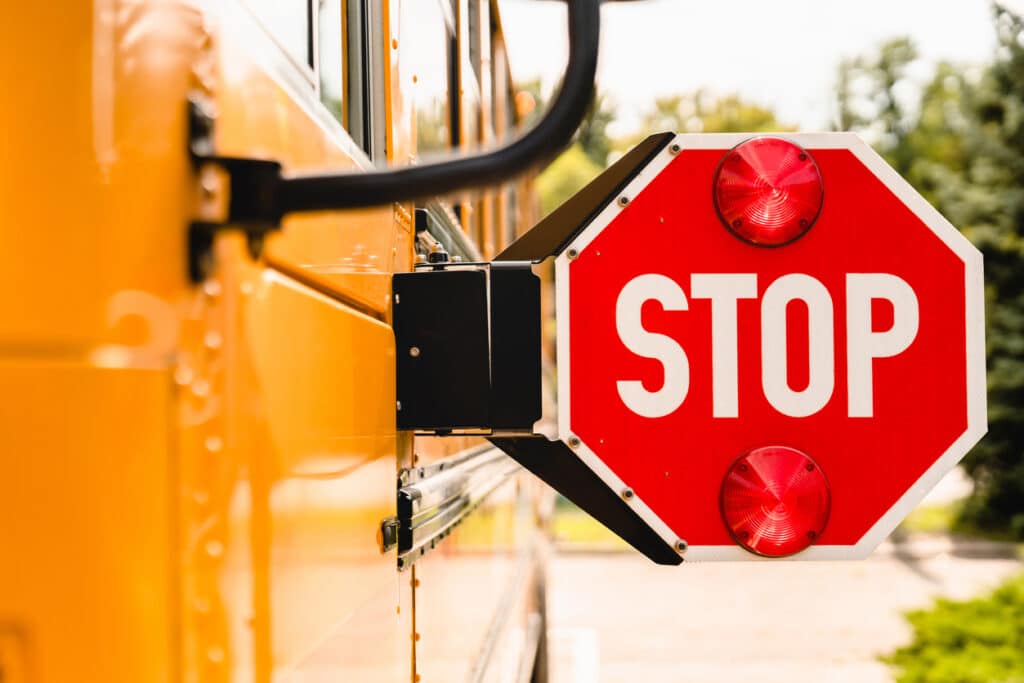If you want to elicit groans from your children, simply mention that it’s time to go back to school. While some kids love the idea of getting back to the classroom, meeting up with friends, and picking out those cool new school supplies, most would like the freedom of summer to last a bit longer. (On the other hand, parents are secretly doing a happy dance!)
Starting a new school year can be both stressful and exciting – but it should also be safe! Increased car traffic, school buses picking up and dropping off, and even participating in sports can all pose safety risks. To keep your kids safe and make it a great school year, follow these safety tips:
For Very Young Students
- Teach young children (especially those going to school for the first time) their phone number, address, how to get in touch with their parents at work and how to get in touch with another trusted adult or how to dial 911.
- Reinforce the lesson of not talking to strangers or accepting rides from people they do not know.
For Kids that Walk or Ride Bikes to School
Teach them to:
- Walk on sidewalks. If there are no sidewalks available, they should walk facing traffic.
- Stop and look left, right and left again to check for traffic.
- Cross the street at corners, obey traffic signals and stay in the crosswalk.
- Never run out into the street or cross between parked cars.
- Always wear a helmet when riding a bike.
If Your Student Takes the Bus
Teach them to:
- Arrive at the bus stop at least 5 minutes before pick-up time.
- Stand away from the curb (at least 6 feet) and avoid playing in the street.
- Never walk behind a bus. Stay in the driver’s sight and avoid the “danger zone” around the bus.
- Cross with caution. If they need to cross the street, be sure they wait for the bus to stop completely and walk at least 10 feet (that’s five giant steps) in front of the bus so the driver can see them.
- Pay attention to their surroundings, watching for other vehicles and cyclists.
- Stay seated while riding on the bus.
- Keep the aisles clear of books, backpacks, and other items for safety and emergency access.
- Respect the driver. Listen to the driver’s instructions and avoid distracting them.
If Your Student is Joining a Sports Team
Make sure they:
- Get a physical or medical check-up before participating.
- Wear the right protective gear, such as helmets, pads, etc.
- Warm up and cool down during practices. Stretching and warming up muscles and cooling down afterwards helps prevent injuries.
- Stay hydrated, especially on hot days. Ensuring kids have a balanced diet also supports their overall health and performance.
- Avoid overexertion. Kids should not play through pain or extreme fatigue. Encourage kids to report any pain or discomfort to coaches so they can address it promptly
- Know the location of the closest first aid kit and AED.
If Your Child is Disabled
All kids deserve to have a positive experience at school. This can be challenging for kids with disabilities, which is why there are specific legal rights protected under federal laws like Individuals with Disabilities Education Act (IDEA), Section 504 and the Americans with Disabilities Act (ADA). Some key rights and protections include:
- Free and appropriate public education (FAPE). Students with disabilities are entitled to a public education that meets their unique needs, provided at no cost to parents.
- Individualized Education Program (IEP). For students with disabilities who qualify for special education services, an IEP is developed to outline specific goals, services and accommodations. Examples of some accommodations include assistive technology, extended time for tests, accessible classrooms, and supportive services like speech therapy or counseling.
- Least Restrictive Environment (LRE). Students with disabilities should be educated alongside their non-disabled peers to the maximum extent possible, with necessary supports and services.
- Students with disabilities cannot be discriminated against in any education program or activity that receives federal funding.
(For more information, read the Guide to Disability Rights Laws.)
If You Need Help
Unfortunately, accidents and injuries still occur even with the best precautions, and laws sometimes fail to protect rights. If your child is disabled and being treated unfairly, there are legal ways to ensure that his or her rights are adhered to. The experienced attorneys at The Disability Guys are here to answer your questions, provide advice, and guide you through the process of getting the benefits you’re entitled to. Call 914-223-8032 today for a free consultation.
After all, you have more important things to do, like picking out all those cool, new school supplies. Have a safe and happy school year!

